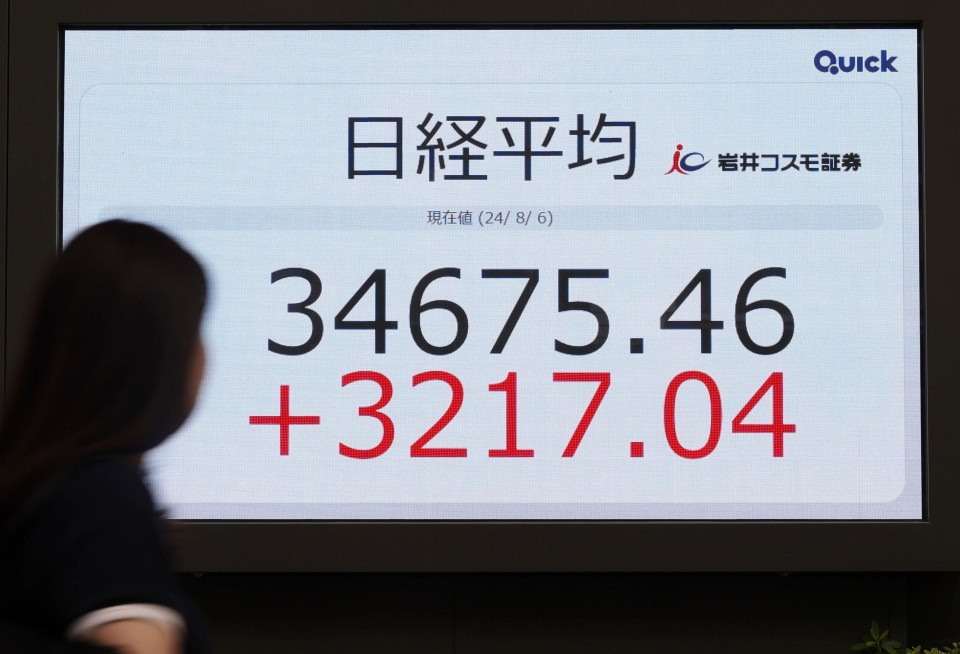TOKYO - The Nikkei stock index closed with its largest single-day point gain in history on Tuesday, soaring over 3,200 points as shares drew widespread buying after the previous day's record plunge.
The sharp rebound, also helped by a weaker yen, came after global stock markets plunged Monday as U.S. recession fears grew due to a recent batch of disappointing economic data, prompting investors to seek safe-haven bonds.

The 225-issue Nikkei Stock Average ended up 3,217.04 points, or 10.23 percent, from Monday at 34,675.46, exceeding the previous day-on-day point gain record of 2,676.55 registered on Oct. 2, 1990.
The broader Topix index finished 207.06 points, or 9.30 percent, higher at 2,434.21.
Every industry category on the top-tier Prime Market gained ground, led by marine transportation, rubber product and consumer credit shares.
The U.S. dollar briefly rose to the lower 146 yen range in Tokyo, after better-than-expected U.S. service sector data for July eased concerns about a recession and helped lift U.S. Treasury yields.
At 5 p.m., the dollar fetched 145.29-31 yen compared with 144.14-24 yen in New York and 143.47-52 yen in Tokyo at 5 p.m. Monday.
The euro was quoted at $1.0926-0928 and 158.75-79 yen against $1.0945-0955 and 157.86-96 yen in New York and $1.0948-0950 and 157.10-14 yen in Tokyo late Monday afternoon.
The yield on the benchmark 10-year Japanese government bond rose 0.130 percentage point from Monday's close to 0.885 percent, as investors sold the safe-haven debt following a surge in equities.
Stocks pared steep losses from the previous day's record 4,451.28 point decline, with the Nikkei soaring over 3,400 points at one point, as investors bought the dip on improved sentiment, analysts said.
"U.S. interest rates began to rise again after the Institute for Supply Management's services data came in better than expected, acting as a catalyst for Japanese stocks to rebound," said Koichi Fujishiro, senior economist at the Dai-ichi Life Research Institute.
The benchmark had lost more than 7,600 points over the past three trading days, following the Bank of Japan's decision last week to hike interest rates and concerns about a possible additional rate increase later this year.
Circuit breakers were briefly triggered for Nikkei and Topix futures Tuesday for the second straight day to halt trading amid volatile movements.
A pause in the yen's appreciation also helped reverse losses suffered by exporter-related issues, as it boosts their overseas profits when repatriated.
But the possibility of another stock market tumble remains if the U.S. Federal Reserve sends a message that is perceived by investors as delaying interest rate cuts, when the financial market is demanding monetary easing, Fujishiro said.
Related coverage:
Nikkei closes with largest point drop in history, down 12%










